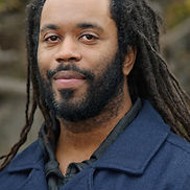Rap legend Tupac Shakur was a ball of confusion, and in a new, revealing film that focuses on his life, he just about acknowledges it.
Pieced together from interviews, performance videos, home movies and other sources, Tupac: Resurrection is a first-person narrative in which the slain recording artist discusses his childhood, career and views of the legal and social system. Shakur eerily paints a portrait of his accomplishments and missteps. His words are even made to appear as if he is commenting on his ultimate fate when he remarks in the final minutes of the movie: “Who shot me? I don’t know.” (The comments actually followed a 1994 shooting which he survived. The still-unsolved fatal shooting came two years later.)
Created in collaboration with the rapper’s mother, Afeni Shakur, the film’s intimacy with its subject is, however, problematic. Tupac: Resurrection suffers a bit from its lack of other perspectives — for example, that of the sister to whom he affectionately refers. And it seems that Shakur, for all his introspection, never quite reached the point of asking himself life’s most difficult questions. What was his purpose? How would he fulfill it?
“I thought I was charming, but I was immature. I did things without thinking,” he confesses. In fact, you’ll cringe when you hear him call out Arsenio Hall, Spike Lee, Janet Jackson and other entertainers as race traitors, particularly as Shakur alternates between his roles as a thought-provoking, sensitive community leader and an angry, ill-raised villain who spits resentfully at television cameras (coincidentally while wearing a Detroit Red Wings jersey).
The artist has an incredible on-screen presence. He’s articulate, even elegant, in an almost shy and reluctant manner. Shakur’s charisma and energy can be felt far more through his toothy, bright smile than through any amount of posturing or pistol-packing intimidation he portrays on posters and CD covers.
At an hour and 45 minutes, Tupac: Resurrection feels longer. Shakur’s views of poverty and its debilitating effects become redundant early on, and the chronology of events is sometimes confusing. The movie also blurs the lines of his transition from the East Coast to the West Coast rap scenes and fails in any way to address the later controversy involving his career with California’s Death Row, the record label he reportedly intended to abandon. In fact, the matter is left quite nebulous, considering that Shakur defends the label’s CEO Marion “Suge” Knight against accusations that Knight is a criminal; it was later widely questioned whether Knight was involved with Shakur’s murder.
Discussing his destiny, Shakur won’t go so far as to claim that he’ll change the world through his music, but he’s almost as bold: “I will spark the brain that will change the world.”
For the sake of his fans and their children, let’s hope it’s for the better.
E-mail Eddie B. Allen Jr. at [email protected].






